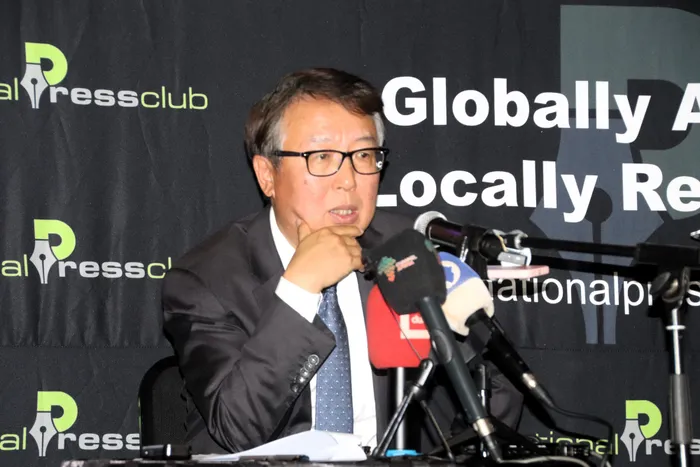Focac: China, Africa join hands in busting poverty, growing economies

Ambassador of China to South Africa Wu Peng addresses South African National Press Club on September 13. Most journalists emphasised that Africa had a lot to learn from China especially in terms of eradicating poverty and boosting economic growth. China has done remarkably well in both aspects while Africa continues to struggle. – Picture: Supplied
By David Monyae
On September 13, the Chinese embassy in South Africa in collaboration with the South African National Press Club hosted a media networking event focusing on the Beijing Summit of the Forum on China-Africa Co-operation (Focac) which successfully concluded on September 6.
The event aimed to reflect on the 9th edition of the Focac Summit and its implications on the relationship between Africa and China going forward. Several South African journalists who travelled to China to cover the Summit narrated interesting accounts of their time covering the event with a generally positive outlook on the future of China-Africa relations.
Most emphasised that Africa had a lot to learn from China especially in terms of eradicating poverty and boosting economic growth. China has done remarkably well in both aspects while Africa continues to struggle.
In his speech, China’s Ambassador to South Africa, Mr Wu Peng, hailed Focac as the guiding force of China-Africa relations, a function it has performed since its inception in 2000. Indeed, Focac has played an important role as a mechanism for co-ordinating and planning co-operation between China and Africa in a wide range of areas.
It is an efficient mechanism which brings China’s 53 bilateral relationships with African countries under one roof to forge a common agenda and deliberate on issues of common interest. The Ambassador’s speech assessed the outcomes of Focac through the ‘5 Cs’ framework focusing on community, consensus, commitment, creativity and coordination.
On the principle of community, Mr Peng highlighted the elevation of the relationship between the two parties to an All-weather China-Africa Community With a Shared Future in the New Era. In addition, China also upgraded its relations with 30 African countries to strategic partnerships. This means that the continent, consistent with its growing stock of strategic importance, will be one of the top priorities in China’s foreign policy.
The necessity of a China-Africa community cannot be overemphasised in the context of the fight for the values of multilateralism, peace and stability, multipolarity, globalisation, equity and fairness, and respect for sovereignty whose violation by some major countries has jeopardised the future of the global order.
The Summit was held under the theme: Jointly Advancing Modernisation and Achieving High-Level China-Africa Relations in the New Era. Hence, the two parties developed a consensus on the vision of modernisation they intend to pursue.
Both sides are adamant that the world cannot modernise if the Global South is not modernised while stressing that modernisation needs to unfold in accordance with respective national circumstances of each country. Both China and Africa agreed that modernisation should be guided by fundamental principles of fairness, openness, people-first, inclusiveness, eco-friendliness, and peace and security.
This is different from western modernisation which was achieved through the exploitation, colonisation, and plunder of the Global South countries. Ambassador Peng argued that this Focac was a reiteration of China’s commitment to its relationship with its Africa. This is especially important in light of the pessimistic views expressed mainly by the western media on China’s commitment to the continent going into the Summit.
However, President Xi Jinping rebuffed these reservations with an announcement of ten major initiatives including mutual learning and inter-civilisational exchanges, connectivity, green development, trade prosperity, industrial chain co-operation, and development co-operation among others.
President Xi said the relationship between the two sides was at its best in history and announced that China would unveil almost US$51 billion in funding to Africa in the next three years in the form of credit lines, investments and aid. This demonstrated China’s willingness to walk the talk in helping Africa achieve its modernisation goals.
The fourth ‘C’ represented creativity. Africa and China must be creative in their pursuit of modernisation since there is no universal manual to refer to. New ideas are needed to explore diverse paths to modernisation that will uplift the countries of the Global South.
Moreover, the role of the arts and creatives in bridging Chinese and African civilisations and creating mutual understanding at a people-to-people level cannot be downplayed. The Focac Action plan rightly committed to promoting the role of creatives through exchanges between China and Africa.
The final ‘C’ focused one co-operation in international affairs. The two sides pledged solidarity with each other and committed to working together to ensure a just and equitable global system through the reform of key institutions such as the United Nations Security Council, the International Monetary Fund, and the World Trade Organisation.
Central to their international agenda is the protection of multilateralism, advancement of the various initiatives on Global Development, Global Security, and Global Civilisation proposed by China. Since the advent of the People’s Republic of China (PRC), China and Africa have always co-operated with each other on the international stage.
They both participated in the 1955 Asia-Africa Conference which forged a common position on the evolution of the global order. African countries famously supported the PRC’s admission to the United Nations in 1971. China has used its permanent seat in the UNSC to protect Global South countries from undue western intervention.
Overall, the 2024 Focac Summit felt like a renewal of marriage vows between China and Africa and the relationship is poised to grow to greater heights in the next three years.
* David Monyae is the Director of the Centre for Africa-China Studies at the University of Johannesburg
** The views expressed in this article do not necessarily reflect the views of The African